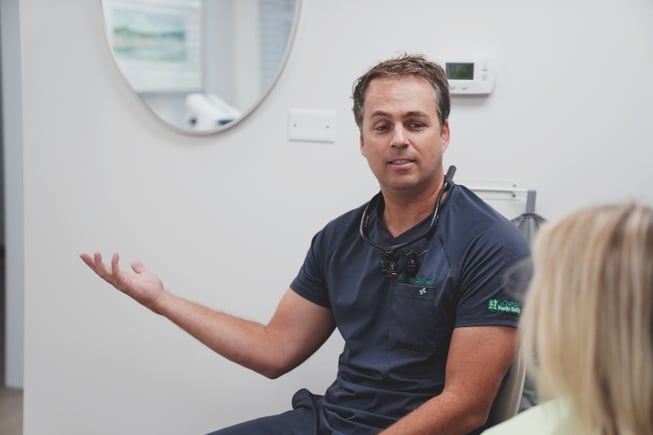Dental practice assessment: 10 questions to measure your productivity


Have you ever taken a dental practice assessment? You’re a dentist that needs a productive dental practice that will lead to increased revenues, happier patients, and a happier dental team. You can figure out how to do this by addressing the productivity of your dental billing process.
Determining the productivity of your dental billing process can be done by answering just a few questions. By assessing the answers you come up with, you can then figure out what the best solution is to increase your collections. Dental ClaimSupport has developed a dental billing assessment tool that helps dental teams see what kind of growth your team needs.
The assessment measures your dental team’s performance, your knowledge of what is needed to get claims paid, and your overall insurance billing score. After you complete the assessment, you'll get a productivity score and a brief analysis of your practice’s current struggles.
In this article, we’ll walk you through the 10 easy questions in our assessment that will determine your productivity score. By thinking about your answers to these questions, you’ll see for yourself where the process will benefit from your attention.
1. What’s your role in the dental practice?
Are you the insurance coordinator, dentist, or office manager? Are you the designated biller? Your perspective when you take the assessment makes a difference, especially if you think one thing, and the rest of your team thinks another about the state of your billing process.
If you’re not the decision-maker, you still have influence in your role. To help the practice, your point of view is especially important, whether or not you are the person directly responsible for the insurance billing process at your practice.
2. How much time does your team have to spend on your dental insurance claims?
Dental insurance billing is a full-time job that requires a lot of attention to detail. Ideally, you have the resources dedicated to maintaining a fast, accurate dental insurance claims process.
But if you’re like many office managers or office administrators, you juggle managing the dental insurance claims process with other duties. You may have noticed that you aren’t able to devote exclusive attention to claims.
This is because each day presents more urgent responsibilities including responding to the needs of the people in your office.
The same goes for dentists who handle insurance collection tasks when they can squeeze them in. Unfortunately, insurers are adept at taking advantage of your limited time. Stall tactics like keeping you on hold for hours, and issuing ever-changing filing rules take more time to work through than you have.
If you don’t have a proven process to keep your the insurance billing process updated and streamlined while you use it every day, it might be time to reconsider another approach.

3. Does your clinical documentation always support the procedure code submitted?
Whoever is creating your insurance claims should know each procedure code and the required clinical documentation that goes with it. This information must be filed with the claim and increases your insurance collection rate.
A huge reason we see claim denials is because of improper coding and lack of proper documentation. Yes, keeping up with procedure codes can be difficult, but it’s necessary to have a productive and profitable dental billing process.
4. What is a good estimate of your insurance claims aging over 90 days?
How many claims on your insurance aging report are over 90 days old? How often is your insurance aging report worked on? Ideally, your insurance aging report is worked on regularly so that claims over 90 days do not pile up. If the timely filing deadline passes, you have to write off the amount instead of collecting it. That’s painful!
Working the aging report is a part of the insurance billing process, and takes a lot of time and research. It also involves getting in touch with the insurance companies which can prove difficult if you aren’t experienced in doing so strategically.
5. When insurance claims are denied, do you appeal?
Your practice should be trying to appeal every claim that is denied. Like everything, you ideally have a process in place for appeals and have someone handling appeals as needed.
When your insurance claim is denied, it’s likely because of a small mistake. Your team should be able to find the mistake, fix it, and appeal the denial. Then, they will know to avoid that mistake in the future. This is money you’ve earned - properly appealing denied claims is crucial.
6. How is your staff turnover?
When your staff turnover is high, it can be hard to maintain an efficient dental billing process. Hiring and training people to perform complex billing tasks, only to see them leave a short while later, is costly and profit-draining!
Ongoing staffing issues not only disrupt the smooth operation of your practice. They drain your mental and emotional energy as everyone struggles to perform tasks outside their area of expertise. This takes time away from your patients and the other tasks that team members need to accomplish to provide a good patient experience.

7. How often do your dentists and staff update their compliance training on CDT codes?
As mentioned, insurance billing requires billers to keep current on CDT codes and insurance regulations which change constantly. This is important because it enables you to keep your process lawful and compliant with each submitted insurance claim.
When your staff is regularly trained on procedure codes, they will face fewer denials, which makes your revenue cycle smoother and more profitable. You will also avoid needless legal trouble if your practice is ever audited or a claim is ever called into question.
8. How often is your staff trained, consulted, or educated in the office?
Training is often an overlooked need. It’s tempting to believe that simply passing down the billing process you’ve always had is good enough. Unfortunately, that’s how low-performing systems become ingrained.
A productive dental practice has continuous training and education for its team. This training can range from best billing practices to best practice management tips, to using your software efficiently.
Keeping your team updated on their billing knowledge can give your team confidence to perform at a higher standard. It is important to take the time to work on your practice and not just in your practice.
9. Is your provider credentialed for in-network insurance participation?
Filing both in-network and out-of-network claims makes your billing system extra complicated. On top of this, the credentialing process is detailed and difficult to manage. Many teams find that getting credentialed for in-network insurance participation takes too much time and work.
And that’s true - it does take a lot of time and it can be a little tedious to complete all of the required documentation and gather all of the requested documents
Consider support for credentialing, and the claims process while waiting for approval. There are services that will handle credentialing and billing for you, and once the provider is credentialed, you won’t have to go through that process again for at least a year or two.
10. How would you prefer to handle your dental billing?
Now that you’ve gone through 9 questions regarding the productivity of your dental practice, you probably have a better understanding of what your practice needs for its billing process to be productive.
Would you rather keep your billing in-house or outsource to a billing company?
The first step to finding a dental billing solution is deciding what is a better fit for your dental practice: in-house or outsourced billing. Both have pros and cons, but outsourcing typically costs much less than hiring a full-time insurance coordinator.
How productive is your dental practice?
Now that you understand why we ask these 10 questions in our productivity assessment, you can take the assessment and view your results. It’s a grade from 1-10 points, 10 being the most productive.
If your score is lower than you thought it would be, it might be time to explore other options for your dental billing. Outsourcing is a great way to clean up your claims process, increase your revenue, and give your in-house team more time in their day to take care of patients and your practice.
When your insurance billing is taken care of, you can work more confidently on the task in front of you instead of constantly putting off your looming unpaid claims. There will be more time to devote to patient relations and keeping the schedule full.
To learn more about how Dental ClaimSupport can help you increase the productivity of your dental practice, schedule a call with us after you take the assessment. We’d love to see where we can help you thrive.
Related Posts
Dental revenue resources from Dental Claim Support

